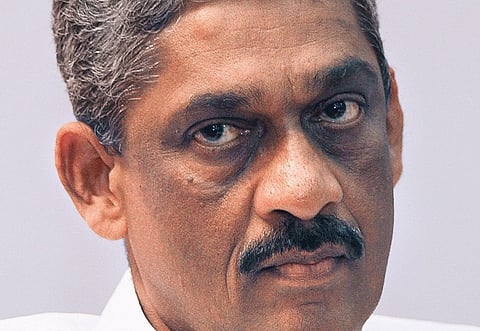Profile: General Sarath Fonseka
A look at the Sri lankan leader

Born on December 17, 1950, in Ambalangoda, a coastal town in the island nation's southwest. He joined the army in 1970 as a staff officer and gradually rose through the ranks.
Fonseka had his education at Dharmasoka College, Ambalangoda (1958-1965) and Ananda College, Colombo (1966-1969).
Fonseka has held a large number of staff appointments including the office of Chief of Staff of the Sri Lankan army, the post he relinquished to take reins as Commander of the Army.
As Deputy General Officer Commanding operation 'Riviresa', he participated in the capture of Jaffna from the Tamil Tigers, in December 1995.
Fonseka, was also involved in operations 'Balawegaya' and 'Jayasikuru', which led to the capture of Elephant Pass and Mankulam. The 6th Battalion of his Sri Lanka Sinha Regiment, which was under siege at Elephant Pass in 1991, repulsed the LTTE attack with reinforcements. He was wounded in 1993 in the 'Yaldewi' operation.
As a Colonel, Fonseka commanded the 23rd Brigade of the Sri Lankan Army at Polonnaruwa in 1993. Among other appointments, he held Colonel, General Staff Army Headquarters, Sri Lanka Army; Centre Commandant, Sri Lanka Sinha Regiment, Brigade Commander in Operation Ballavegaya, Deputy Commandant - 5 Brigade Group, Mannar and Coordinating Officer for Gampaha.
On 25 April 2006, Lt. General Fonseka survived an LTTE suicide bomb attack by a pregnant LTTE operative who infiltrated the army base by attending the regular maternity clinic provided for civilians at the army base military hospital. He was seriously injured and nine others were killed. He resumed his duties in July 2009.
On 18th May 2009, the Sri Lanka Army, under the leadership of Gen. Fonseka, together with the Sri Lanka Navy and Sri Lanka Air Force, completely defeated the LTTE after 26 years of civil war. General Fonseka is considered a national hero by the majority of Sri Lankans as a result this achievement.
Fonseka was made the Chief of Defence Staff by the President effective from the 15th July 2009. He is the first Chief of Defence Staff appointed under the newly approved Chief of Defence Staff Act. The post coordinates all three armed forces
Sarath Fonseka Officially handed over his resignation to the President through the Secretary of Defence on 12th November 2009. He left the Office on 16th November.
On 29th November 2009, Generela Sarath Fonseka formally announced his candidacy at the next Presidential election scheduled to be held on 26 January 2010. Fonseka ultimately failed to win enough votes. The country's Tamil and Muslim minorities were largely disenchanted with both candidates, who hail from the country's ethnic Sinhalese majority.
Fonseka refused to accept the election results, speaking conspiratorially of plots to assassinate him. His opponents in power accused him of planning to topple the government
On February 08, 2010 over 100 soldiers burst into a political meeting Fonseka was attending and took him away as prisoner.
Sign up for the Daily Briefing
Get the latest news and updates straight to your inbox



